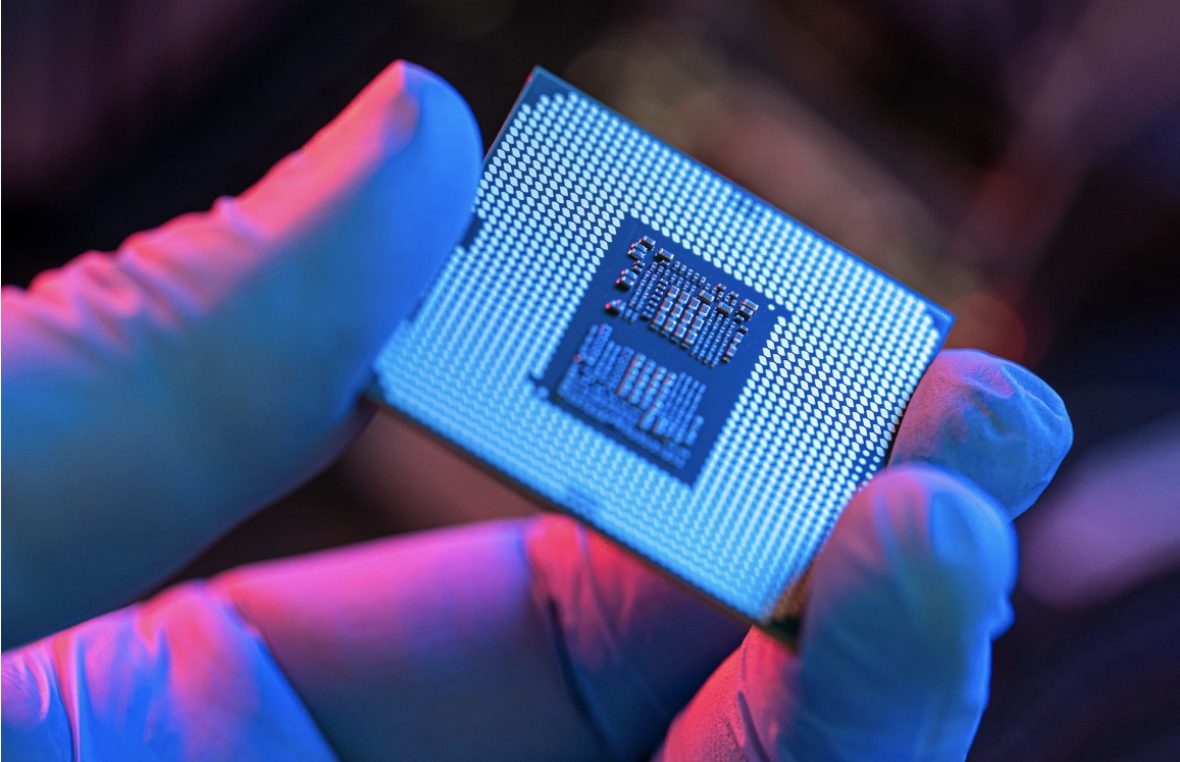Global Courant 2023-04-29 04:13:08
It was the ultimate chip war that never was: German officials denied that Berlin was planning to stop exporting specialty chemicals for chip manufacturing. Reuters reported April 27 — a day after Bloomberg News claimed Olaf Scholz’s administration was “in talks” on the subject, presumably under Washington’s urging.
Share prices of BASF and Solvay, the largest makers of the specialty products, plummeted Thursday after the Bloomberg report came out, but rallied strongly on Friday following the government’s denial.
More than one dozens of chemicals including acids, bases and solvents are indispensable to etch microcircuits onto silicon wafers, and a supply interruption would cripple China’s manufacturing capacity. Restricting these chemicals would escalate the chip war far beyond the scope of the Biden administration’s Oct. 7 controls on semiconductor devices and design software for the most advanced chips, used in advanced smartphones, servers and artificial intelligence applications. The target would include all chips, including so-called mature processes.
In related news, US Secretary of Commerce Gina Raimondo announced on April 26 that the US will consider banning exports to Chinese cloud computing companies, including Alibaba and Huawei. Raimondo was responding to a letter from a group of senators led by Bill Hagerty (R-TN) warning that Chinese cloud computing threatens US “national security and economic security”.
The Biden administration is also expected to ban U.S. investment in unannounced high-tech industries in China.
Republicans on the House Foreign Affairs Committee, meanwhile, are finalizing a three-month investigation into the Commerce Department’s enforcement of chip checks and have proposed legislation that would make the Defense Department responsible for enforcing the ban. Gregory Allen of the Center for Strategic and International Studies argued in congressional testimony on April 13 that “China’s activities to circumvent export controls are significant and increasing. My main recommendation is that Congress focus on concrete strategies to tighten this enforcement and close the remaining gaps that risk China being able to close the AI gap.”
Washington is doing everything it can to restore credibility to its effort to contain China after a series of Chinese diplomatic victories, including the Beijing-brokered restoration of diplomatic ties between Iran and Saudi Arabia, the visit of French President Emmanuel Macron to Beijing in a show of independence from Washington and the visits of Brazilian President Lula and Malaysian President Anwar Ibrahim.
Ukrainian President Zelensky’s call to Xi Jinping and the dispatch of a special Chinese envoy to Ukraine additionally raise the prospect that China will pick up the pieces in Ukraine after a drumroll of damaging Pentagon leaks revealed just how badly America stumbled .
Ahead of the 2024 presidential election, the Democratic administration is sensitive to claims by Republicans that it is going too easy on China.
China’s economic success in the Global South threatens to pull key countries out of the US orbit. As of March, Chinese exports to ASEAN countries rose 35% year-on-year and exports to Central Asia (including Turkey and Iran) rose 55%, Global Courant reported on April 25. China now exports more to the South than to developed markets.
Washington’s controls on the export of high-quality chips and chip-making technology to China, announced on October 7, 2022, were designed to deny China access to cutting-edge hardware that supported the most advanced AI applications. In contrast, the Commerce Department has shown flexibility by allowing semiconductor equipment manufacturers to ship machines that produce mature chips.
The Biden administration adjusted its strategy from a September 2022 report from the Special Competitive Studies Project, chaired by former Google CEO Eric Schmidt. This provided a response to China’s growing military might, as proposed by Silicon Valley software venture capitalists: an “Offset-X strategy” including “distributed and networked operations, human-machine collaboration, human-machine teaming, primacy in software-centric warfare, resiliency and greater technology interoperability and interchangeability and partners.”
Eric Schmidt speaks at a National Security Commission on Artificial Intelligence (NSCAI) conference on November 5, 2019 in Washington, DC. Photo: Global Courant Files/Alex Wong/Getty Images via AFP
That was a Silicon Valley futurist’s vision of warfare, separate from military technology that will triumph in the near future. Both the US and Chinese military use older generation chips for detecting, targeting and processing information. The older chips are more robust and easier to harden, like February 2022 Rand Corporation study explained.
The Biden administration has seriously underestimated the power and importance of mature chip technologies (14 nanometers and above), which make up 95% of the global chip market and power 5G infrastructure, industrial productivity applications and other so-called Fourth Industrial Revolution technologies. Semiconductor manufacturers depend on mature chips for most of their revenues, and China’s massive investment in a domestic supply chain threatens to erode the financial base of the entire Western chip industry as Dimitri Alperovich of Silverado Incubator has observed.
One problem is that cutting off the Chinese market could have disastrous consequences for the revenues of Western high-tech companies. The Atlantic Council warned in a March 2023 report: “While the steps taken by the Biden administration to limit China’s progress in producing advanced semiconductors appear to have been calibrated to avoid widespread disruption to the industry, the policy has painful consequences that cannot be downplayed….the bottom-line impact can be felt in terms of what the industry calls a “significant loss of scale” that could reduce resources for R&D and new investment…. It is essential that the semiconductor industry – and US allies, as discussed below – have a voice in assessing the potential impact of additional proposed restrictions. Communication is essential to prevent unintended consequences.”
To make matters worse, US sanctions on the sale of high-end chips to China are extremely difficult to enforce. To comply with sanctions Nvidia lowered the clock speed on a variant of its GPUs, the standard for high-end servers, while selling virtually the same product to China.
In addition, the global chip market is so complex and opaque that Chinese companies can buy whatever they want on the gray market, and the enforcement capacity of the Department of Commerce is woefully inadequate to prevent this, Allen said. Chinese sources say high-end GPUs are freely available at a 10% premium over the going price.
Chinese commentators compare the Chip War to the Chinese Civil War. By focusing on low-end chips and undercutting Western manufacturers’ prices, “Observer” columnist Chen Feng says China will “surround the cities from the countryside,” a reference to Mao’s successful military strategy during the 1940s civil war. The United States “can only go to Menglainggu (the site of a decisive communist victory in 1947) by relying on high-end chips.” As noted, analysts like Alperovitch have already identified the danger.
On March 27, Huawei announced that it had developed its own chip design software for mature nodes 14 nanometers and wider; if true, that would be a big step toward Chinese independence from the US design firms Cadence and Synopsis, which have held a near-monopoly on the technology.
As the Atlantic Council suggested, the Biden administration appears to have given US companies significant leeway in exporting to China. LAM Research, a leading U.S. semiconductor equipment maker, predicted an increase in sales to China for the remainder of 2023, after receiving “clarification” of export regulations from the Biden administration. Dutch chip lithography giant ASML also predicted an increase in Chinese sales this year, and its CEO Peter Wennink stated that “the mature semiconductor space is very important and needs to grow. And this is where China is very strong.”
The reported Berlin ban on semiconductor chemicals may have failed, but it was the first salvo of what will be a long war of tech attrition.
Similar:
Loading…








